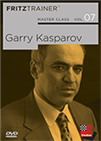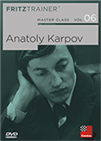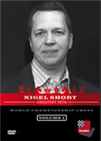London as a chess city
London plays a major role in the history of modern tournament chess, as it was here in 1851 that the first major international chess tournament took place. Howard Staunton, Shakespeare researcher and one of the world's top chess players, organised it, invited the best players in the world, and actually expected to win it himself, but was thwarted by a Warsaw high school teacher by the name of Adolf Anderssen.
Many professional players set up shop in the English capital, including Wilhelm Steinitz, the first official World Champion and his successor Emanuel Lasker. In the first half of the 20th century, London was undoubtedly a leading chess capital. But then the centre of the chess world shifted more and more to the USA. The two world wars had seriously weakened England economically, and especially after the Second World War hardly any major chess tournaments were organized on British soil, in part because there were no world-class English players.

Trafalgar Square with 'The Tournament' chess set installation by Jamie Hayon, in front of The National Gallery | Photo: Paul Leonard CC-BY-SA-2.0.
This began to change in the 1970s. English millionaire and chess champion James Slater put up GBP £5,000 for the first Englishman to win the Grandmaster title. Anthony Miles succeeded and with his success chess became popular again in England.
When Garry Kasparov made his initial assault on the world title in 1983, he was due to play a Candidates match against Soviet dissident Viktor Korchnoi. The venue was Pasadena, California, but the Soviets did not want to let their players compete in the USA. Kasparov felt cheated and raised a ruckus. His mentor Heydar Aliyev, at first head of the KGB in Azerbaijan, then a member of the Politburo, came to his aid and made sure that the candidates fight against Korchnoi would go ahead — in London. Raymond Keene, England's second Grandmaster, now on the road as a functionary in the World Chess Federation, played no insignificant role.
In 1984, Kasparov started his epic match against World Champion Anatoly Karpov that was cancelled by the then-FIDE President Campomanes and set to be replayed. In the rematch, after 24 games Kasparov won 5:3 with 16 draws and became the 13th World Champion. However, the dethroned Karpov had a right of revenge, according to the rules of the day, and so Kasparov had to defend his newly won title almost immediately.
 On this DVD a team of experts gets to the bottom of Kasparov's play. In over 8 hours of video running time the authors Rogozenko, Marin, Reeh and Müller cast light on four important aspects of Kasparov's play: opening, strategy, tactics and endgame.
On this DVD a team of experts gets to the bottom of Kasparov's play. In over 8 hours of video running time the authors Rogozenko, Marin, Reeh and Müller cast light on four important aspects of Kasparov's play: opening, strategy, tactics and endgame.
Kasparov and Karpov | Photo: S.M.S.I., Inc. - Owen Williams, The Kasparov Agency CC-BY-SA-3.0, via Wikimedia Commons
London was again the venue of choice for the first half of this rematch, with Ray Keene as organiser. The match then shifted to Leningrad — the first time ever that two Soviet chess grandmasters competed for the World Championship outside the Soviet Union, as it began to open up under the leadership of Mikhail Gorbachev. Interest in the West was correspondingly high.
The competition was ceremoniously opened on July 27th 1986 at the Prince Edward Theatre, where the musical "Chess" by Tim Rice, with music composed by ABBA's Benny Andersson and Björn Ulvaeus, had made its debut two months earlier. Tim Rice also choreographed the opening ceremony of the World Championship. The celebration was projected to cost on the order of GBP £100,000. One prominent guest of honour was the English Prime Minister Margret Thatcher, who greeted the players with a speech and participated in the drawing of lots. [32 years later, not a single British politician visited the Carlsen vs Caruana match in London, due to the current political friction between Russia and the UK. Russian companies sponsored the match, which was officiated at both the beginning and end by newly elected FIDE President Dvorkovich, the former Deputy Prime Minister. -Ed.]
The games were played at the Park Lane Hotel, a 1927 Art Deco-style house on Piccadilly opposite Green Park.
 On this DVD a team of experts looks closely at the secrets of Karpov's games. In more than 7 hours of video, the authors examine four essential aspects of Karpov's superb play.
On this DVD a team of experts looks closely at the secrets of Karpov's games. In more than 7 hours of video, the authors examine four essential aspects of Karpov's superb play.On every match day, long lines of chess-friends lined up in front of the entrance, waiting for tickets. After twelve games Kasparov led with 2 wins to 1 with 9 draws. The players moved to Leningrad, where Kasparov won by a final score of 12½:11½. Incidentally, the players had to donate their prize money to the victims of the Chernobyl disaster — nuclear power plant in Ukraine suffered its catastrophic fire on April 26th, 1986.

Karpov-Kasparov | Photo: Kasparov
After two more successful title defences against Karpov, Kasparov returned to London in 1993 for a title fight against Nigel Short in a match organised without the participation of FIDE, that initiated a 13-year schism in the World Championship title. Once again, Keene was the organizer, with the main sponsor The Times of London, where Keene held a chess column. Kasparov and Short set up the "Professional Chess Association" (PCA) and played the match under its banner, which Kasparov later would call "a mistake".
The competition was played from September 7th to October 21st, 1993 at the old Savoy Theatre in Trafalgar Square and was fairly one-sided. For the seventh game on September 21, 1993, the Princess of Wales Lady Diana visited the competition. Before the match, she had personally wished Nigel Short luck. She watched the game in the royal box. Kasparov had focused so much on the game that he barely noticed. Royal well-wishes proved ineffectual for Short and Kasparov won his fourth game of the match that day. By the end of Game 20 (from 24 scheduled games), he assured himself of the match.
 Nigel Short takes us on an electrifying journey through a very rich chess career, which saw him beat no less than twelve world champions. His experience in tournaments and matches all over the world – Short has visited a total of 89 countries – can be seen in the narratives that precede the games which he annotates with humour and instructive insights.
Nigel Short takes us on an electrifying journey through a very rich chess career, which saw him beat no less than twelve world champions. His experience in tournaments and matches all over the world – Short has visited a total of 89 countries – can be seen in the narratives that precede the games which he annotates with humour and instructive insights.Seven years passed before Kasparov played once again in London for the World Championship — his last. There was not much left of the splendour of bygone days. Kasparov's dispute with FIDE had damaged the reputation of the sport and FIDE held parallel World Championships, confusing the public, and exacerbating the problem of obtaining sponsorship money.
In 2000, again it was Raymond Keene who arranged match funding through the company "Brain Games". Kasparov's opponent was now his young compatriot Vladimir Kramnik. The 2000 World Chess Championship was played at the Riverside Studios in Hammersmith, London. Originally opened as a film studio in 1933, the Riverside Studios already had an eventful history behind them. The BBC produced TV programs here after the war. In 1980, Samuel Beckett, also a great chess lover, staged his plays "Endgame" and "Waiting for Godot". At times the house was used as a cinema.
By the time Kasparov and Kramnik played their match here, the location was a bit run down.

Riverside Studios in Hammersmith, view from the River Thames | Photo: Ben Bartels

Riverside Studios, Eingang | Photo: Ben Bartels
Keene believed that he would get rich thanks to an entirely new medium, the "Internet", with an exclusive live broadcast of the World Championship games. Some British investors apparently believed it too, but in 2000 not many chess fans had Internet access and there has never been a legally enforceable exclusive right to the notation of chess games. Even so, the prize fund for the two players was still a quite impressive USD $2 million, which is more than two and a half times the Carlsen vs Caruana prize fund (adjusted for inflation).
The 25-year-old Kramnik defeated Kasparov thanks in no small part to Kramnik's "Berlin defence" which proved insurmountable for Kasparov, and earned the opening the nickname the "Berlin Wall" in chess circles. The defending champion could not win a single game and lost twice. Kramnik became the 14th world chess champion. Kasparov retired from professional chess five years later.
Translation from German and additional reporting: Macauley Peterson and Johannes Fischer
On this DVD Vladimir Kramnik retraces his career from talented schoolboy to World Champion in 2006. With humour and charm he describes his first successes, what it meant to be part of the Russian Gold Medal team at the Olympiad, and how he undertook the Herculean task of beating his former mentor and teacher Garry Kasparov.
Links
Stories on:
























